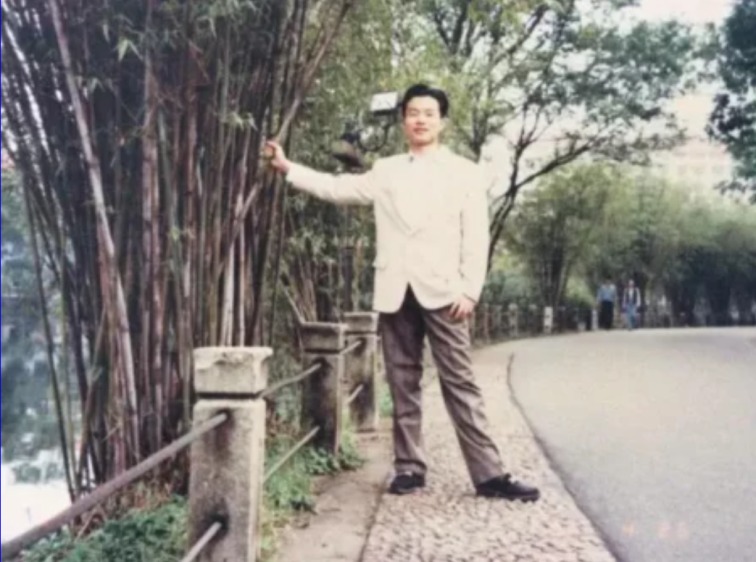On November 2, 2025, Falun Gong practitioner David Xie, who was persecuted in China, was interviewed in Port Jervis, New York. (Petr Svab/The Dajiyuan)
[People News] David Xie’s eyes could only face the ceiling. A glaring white light shone on his face 24 hours a day without interruption, yet he could not turn his head away. However, that wasn’t the most unbearable part.
He was forced to lie on his back in a “大” (big character) shape on a specially made iron bed. His hands were raised above his head and handcuffed to one end of the bed; his legs were spread apart and tied with cloth strips to the other end. The Chinese Communist authorities subjected him to indefinite illegal detention. There was no fixed sentence, and no future he could place hope in.
Xie recalled that the abusive guards called this torture device the “dead man’s bed.” Although he had previously endured beatings and other atrocious tortures, the “dead man’s bed” was even more brutal—people were tied to it for long periods without being allowed to move at all. He said it didn’t take long before his body began to ache. And the torment was endless; even if the victim wished for death, there was no way to die. They were kept alive on IV drips while tied to the “dead man’s bed,” day after day, week after week, month after month.
“This kind of torture makes you completely hopeless. It’s horrifying. The psychological torment is even more cruel and ruthless than the physical torture,” Xie told The Dajiyuan.
While tied to the “dead man’s bed,” Xie didn’t even know where he was—he only knew that the guards wore Beijing Armed Police uniforms. But he knew why he was imprisoned.
The lead abusive officer, Hu Zihui, shouted at him: “I’m telling you, you get released from this bed only when you’re ‘transformed.’ Otherwise, prepare to die on this bed.”
“Transformation” is a term used by the Chinese Communist Party’s state security agencies, referring to forcing someone to renounce their faith—in Xie’s case, pressuring him to give up Falun Gong. Falun Gong is a spiritual practice that teaches people to follow the principles of “Truthfulness, Compassion, Forbearance,” and includes slow, gentle meditation and exercises.
Falun Gong spread rapidly across China in the 1990s. At first, China’s state-run media praised Falun Gong for its health benefits. However, when government investigations found that over 70 million people were practicing, the CCP’s attitude changed. On July 20, 1999, CCP state media suddenly announced a ban on Falun Gong and launched overwhelming smear campaigns.
In 1998, while attending university in Shanghai, Xie began practicing Falun Gong after being introduced to it by relatives and professors. He said he was immediately deeply drawn to its teachings.
“I had never read a book, learned a theory, or taken a course that truly taught people to be good and kind, or genuinely guided people to cultivate themselves according to the standard of Truthfulness, Compassion, Forbearance,” he said.

In April 1998, Falun Gong practitioner and torture survivor David Xie in China. (Courtesy of David Xie)
Xie said he suffered from heart disease, experiencing monthly episodes of paroxysmal tachycardia that left him gasping for breath and feeling like he was dying—extremely uncomfortable. After he began practicing Falun Gong, his heart symptoms almost completely disappeared, and the depression caused by his heart condition also vanished.
Xie lived with his parents in Shanghai and attended university there. In July 1999, he traveled about 300 miles west of Shanghai to Anqing City, Anhui Province, to visit his grandparents. When news of the ban on Falun Gong broke, he simply couldn’t understand it.
“The day before we could still practice, and the next day it was prohibited,” he said.
At age 21, Xie said he wasn’t interested in politics and didn’t have strong views about the CCP. Looking back now, he said he had no idea what kind of regime he was living under at the time.
“Unimaginable,” he said. “How could a government force people not to practice exercises? It was absolutely unbelievable. The only thing I could think was that they made a mistake.”
So he decided to appeal to the provincial government.
“Since they made a mistake, we should explain to the government that Falun Gong is good and that they were wrong,” he explained.
Xie said he wasn’t the only one who thought this way—when he arrived at the government building, a group of people were already quietly waiting outside.
“As soon as we got there, the police began arresting people,” he recalled.
Xie and the others were taken to a remote mountain village. There, the police registered their information, repeatedly broadcast slanderous propaganda about Falun Gong through loudspeakers, and then transported them by bus to a larger city, where they were released.

In February 1999, Falun Gong practitioner and torture survivor David Xie in China. (Courtesy of David Xie)
Going to Beijing to Appeal
Xie said he spent several months sorting out his thoughts. In October 1999, he decided to go to Beijing to petition the central government. In theory, petitioning is a legal method for Chinese citizens to express grievances to the authorities.
To say the least, he was unprepared. When he got off the train, he had no idea where to go or what to do. He knew no one in Beijing. The only thing he could do was find a place to sleep in a university classroom building that was still under construction.
“I laid out a newspaper there and fell asleep,” Xie recalled.
Coming from the mild climate of Shanghai, he was awakened in the middle of the night by Beijing’s chilly October weather.
“I got up and walked around to warm myself up,” he said.
Xie didn’t know that he was already being watched by the authorities. The CCP central government had a policy that local officials would be punished if residents from their jurisdiction traveled to Beijing to appeal because of Falun Gong. Xie later learned that several people from his Shanghai university had come and were waiting near Tiananmen Square—once he appeared, they would take him away.
“I heard that they would sit there all day on stools, waiting,” he said.
The next day, Xie faced a dilemma. If he returned home, he might be arrested or permanently banned from returning to Beijing. But if he stayed, he would soon run out of money.
“I felt like I hadn’t finished what I came to do,” he said.
Xie decided to stay and look for a job. At night, he secretly slept in university classrooms.
Soon after, he found a job selling electronics door-to-door. The boss promised him a 100-yuan commission for each item sold. But more than a month passed, and he didn’t sell a single product. With his last 5 yuan, he bought plain steamed buns and ate only one per day so he could stretch them out over several days. His boss arranged a dormitory for him—he shared one room with six other workers.
Xie said everyone in the dormitory knew he practiced Falun Gong, but apparently no one reported him to the police. In his view, his behavior spoke louder than the overwhelming propaganda. He worked hard and was always willing to help others. Since he volunteered to do the cooking for everyone, the other workers were grateful to him.
Gradually, Xie began to earn more money—enough to support himself—and he became a lower-level manager.
One day, he went to a wholesale market to buy supplies. When he mentioned to one merchant that he was a Falun Gong practitioner, the merchant told him there was another practitioner in the market. Although it took time to find him, it was very meaningful for Xie—he connected with his first fellow practitioner in Beijing.
In 2001, the company Xie worked for went bankrupt. Thinking the persecution might have eased, he decided to call home.
Before leaving, Xie had left a letter for his mother explaining why he went to Beijing. But after he left, he never contacted them, and his mother was extremely worried. When she received the call, she told him to return to Shanghai immediately. When Xie returned, he discovered he had been expelled from school for going to Beijing—even though he had never actually petitioned at any government offices there.
The CCP’s persecution of Falun Gong had not eased—it had intensified. Xie was deeply concerned. Knowing conditions in Beijing were terrible, he wanted to see how he could help. When he met some practitioners from Beijing, he asked what he could do. They told him they needed people to circumvent China’s internet firewall and download materials exposing the persecution of Falun Gong. Most of them were elderly and didn’t understand computers—but Xie had no problem with that.
So he returned to Beijing, rented a small apartment, bought a computer and a printer. He printed materials and passed them to someone else, who then distributed them further. At the time, this was only a temporary arrangement. But similar materials sites soon sprang up across China—according to later estimates by Freedom House, there were hundreds of thousands across the mainland.
Before long, Xie also began distributing the materials himself. It was a nerve-wracking effort. He recalled that the entire city carried an ominous atmosphere.
“You could often see many uniformed police patrolling the streets and subway stations—people were patrolling everywhere,” he said.
Each time he carried Falun Gong materials outside, Xie felt tremendous pressure. If anyone discovered he had them, it meant being arrested and sent to prison or a labor camp.
On a cold winter day in December 2001, Xie’s fears became reality. As he walked along Beijing’s North Third Ring Middle Road, two men blocked his path. When he tried to step back, he saw that two others were already behind him.
“I had no mental preparation at all,” he said.
They pinned Xie to the ground, pulled his hands behind his back, put handcuffs on him, and placed a hood over his head.
Illegal Detention and Torture
Xie Ge was taken to a secret location for interrogation. Several police officers tried to force him to disclose information about other Falun Gong practitioners he knew, but he said nothing. Then he was beaten.
One officer strangled his neck with a baton to prevent him from making any sound. Another officer began striking his back and thighs with a baton.
“He hit very hard,” Xie recalled.
The batons they used were iron rods wrapped in rubber. Such batons cause great pain when they hit a person, but injuries are not easily visible right away, making it easier to cover up the abuse. Just before Xie was about to pass out from lack of oxygen, the officer briefly loosened his grip to let him breathe for a few seconds, then strangled him again and continued beating him violently with the rubber baton.
He said that it was then he realized these officers knew exactly what they were doing, and that they were very “skilled” at it.
It was at that moment that Xie realized the CCP was “evil to the extreme.”
“All of a sudden, I realized that the Communist Party was nothing like the image it portrayed in textbooks,” he said.
Xie said these officers were “completely inhumane.” Whenever he refused to “cooperate,” they threatened to kill him.
“We’re going to hang you from a tree for a whole night, and then dig a pit to bury you alive,” they threatened.
“How could a normal police officer say such a thing? That’s impossible,” Xie said.
Another threat they used was: “We’ll send you to the Northeast.”
Xie did not know what that meant at the time. He said he learned years later that Northeast China was one of the earliest regions where the CCP began killing Falun Gong practitioners and selling their organs.
After the beating, Xie was hooded again and escorted to a secret detention center. He didn’t know where he was, and even if he did, it wouldn’t help. On the shabby building were large characters reading “Beijing Legal Education Center.” In reality, it was a place for brainwashing and torture.
The CCP established many such facilities across China with the aim of “transforming” Falun Gong practitioners. According to testimonies collected by Minghui.org (a website dedicated to sharing Falun Gong information and exposing the persecution), these facilities can detain practitioners illegally for days or even months without any legal procedure.
Xie was kept in a solitary cell equipped with surveillance cameras, and his every movement was monitored 24 hours a day. He was forbidden from any contact with the outside world.
Xie began a hunger strike to protest. But the guards used this as an excuse to inflict another type of torture—force-feeding. Several armed police officers held him down in a chair while another forcibly inserted a long rubber tube through his nose, down his throat, and into his stomach.
“This torture caused me immense pain,” he recalled.
Xie was force-fed many times. On one occasion, the rubber tube was not inserted into his stomach but into his lungs. A police officer who doubled as the “medical worker” realized this and pulled the tube out—had he not done so, Xie would have died from this torture. Minghui.org has recorded many such cases.
Another torture method was freezing. In the bitter winter cold, guards would burst into his cell in the middle of the night and pour cold water over him from head to toe. They drenched him completely and then opened the doors and windows so cold wind would blow in. Xie shivered uncontrollably, and his teeth chattered nonstop.
They also spread rumors, claiming that other Falun Gong practitioners had already given up practicing and had begun cooperating with the police.
“They just wanted to make you feel that if others did it, then you should do it too,” Xie said.
Even under such circumstances, Xie still refused to renounce his faith.
So they resorted to a more brutal torture method: the “dead person’s bed.”
Xie was tied to the “dead person’s bed” for more than seven months, until he became extremely weak, with a faint heartbeat and blood pressure dropping to only 40/70—on the brink of death. Realizing he was in critical condition, the guards finally released him from the bed.
“They didn’t want to bear the responsibility for killing me,” Xie said.
After being released from the “dead person’s bed,” Xie’s muscles were severely atrophied.
“It was like I couldn’t stand anymore,” he recalled. “My arms wouldn’t move either.”
About two months later, he was transferred to a labor camp—the official name was Beijing Tuanhe Reeducation-Through-Labor Camp.
No More Fear
By that point, Xie felt he had completely let go of the fear of pain and death. The guards could no longer threaten him with anything, and they seemed to understand this. Xie could even practice Falun Gong exercises in the cell without anyone stopping him, and his health gradually recovered as a result.
However, once his health slightly improved, the torture resumed. This time it was the “tiger bench.” Xie was forced to sit on a very small stool for about 18 hours a day, unable to move. This seemingly simple torture method caused unbearable pain.
Even so, the torture failed to break him. In January 2004, after serving a one-year labor camp sentence, he was finally released.
After gaining his freedom, Xie returned to Shanghai. A few years later, after enduring enormous suffering, he escaped China and came to the United States.

On November 2, 2025, Falun Gong practitioner and torture survivor Xie Ge (David Xie), who was persecuted in China, is interviewed in Port Jervis, New York. (Petr Svab/The Dajiyuan English Edition)
“After coming to the United States, I truly understood the meaning of freedom,” Xie said. “Here, I can freely practice Falun Dafa, meditate peacefully in the park without fear, and even march with tens of thousands of fellow practitioners on the busy streets of Manhattan. Such a scene is unimaginable in mainland China.”
He said that much of the persecution exploits people’s fear. People in China develop a self-protective mindset and dare not do anything that might offend the CCP, and the CCP uses precisely this to carry out its persecution. However, the reality is the exact opposite. Xie said that only when he truly let go of fear did the persecutors stop persecuting him.
“After that, they no longer dared to persecute me,” he said.
Xie expressed deep gratitude to the United States for giving him a chance to live a life with dignity.
“On this land of freedom, I finally experienced that the basic human rights and freedom of belief every person is born with are respected and realized,” he said.
“I hope that in the near future, everyone living in mainland China will be able to experience this kind of freedom, dignity, and happiness.”
(Written by Petr Svab, The Dajiyuan English Edition / Translated by Zhang Zijun)








News magazine bootstrap themes!
I like this themes, fast loading and look profesional
Thank you Carlos!
You're welcome!
Please support me with give positive rating!
Yes Sure!